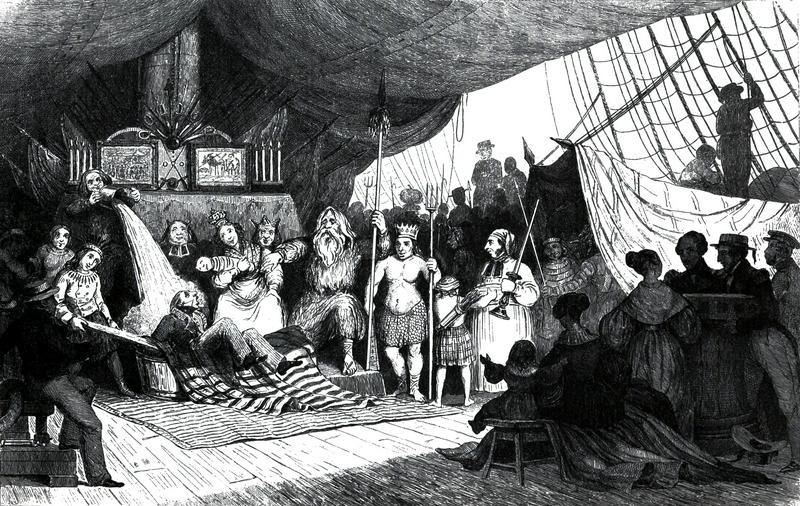Crossing the Line: One of Maritime History's Oldest Traditions
By | May 22, 2019

Imagine that you are in a cabin aboard a ship when one night you receive a summons from King Neptune to mark your first crossing of the equator. You are to appear before his court the next day. You are not only to be inducted into the mysterious rites of the sea, but you are to answer charges of seasickness, overstays of liberty, and other charges that you know are false. Curious, you come on deck in the morning and find yourself surrounded by Neptunus Rex and his court. Not only is the old sea god there, but Davy Jones and Amphitrite are in attendance, too.
You are not the only person who has been summoned. Every member aboard the ship who is a “polliwog” (sometimes spelled polywog or pollywog) and about to cross the equator for the first time is to be inducted and become a “shellback.” You are about to undergo the venerable line-crossing ceremony, one of Maritime history’s oldest traditions.

The earliest verified line crossing ceremony occurred in 1529 in a French vessel named the Parmentier on a voyage to Sumatra. But the ceremony is undoubtedly a far older tradition where seasoned mariners would call upon landlubbers to prove their worth at sea and to show that they can put up with boisterous shipboard humor. It is also possible that the ceremonies hark back to ancient practices where a sacrifice was made to a deity.
The first recorded ceremonies in the 1500s were religious. The rite aboard the Parmentier consisted of reciting prayers, eating a fish, and dropping silver coins into the ocean. By the end of the century, the ceremony had evolved into the familiar tradition of today which included a visit by Father Neptune who demanded a tithe in silver from the polliwogs. If the polliwog did not pay, then he would be shaved and drenched with water (either by bucket or a dip into the sea). A feast and celebration followed.

Each member of the Court of Neptune is a veteran mariner who had crossed the equator in earlier voyages and had become a shellback. Neptune himself was typically played by the most senior crew member aboard ship. Each of the members of the court also took great pains in making sure that their costumes, if not accurate, were farcical enough for the ceremony. In addition to Neptune, Davy Jones (who often plays the judge demanding answers to the crimes of the polliwogs), and Amphitrite, there are other usual participants such as a scribe, doctor, sea hag, chaplain, jesters, and assistants who dunk the inductees. There is also the “Royal Baby” who typically is the fattest man aboard a vessel and wears a diaper.

Over time, the ceremony has continued to evolve. The tithe to forgo the ceremony has disappeared and more violent aspects of the ceremony have been reduced. Still, it is hazing. While the actual details of the ceremony vary from voyage to voyage, there are common elements. The ceremony begins with Neptune thumping a faux trident on the deck three times and commanding the rite to commence. The roll is called and some of the charges are read. Then the initiation began.

Polliwogs are to overcome a series of obstacles or go through a set of stations. They may have to undergo a shave, be smothered in molasses, crawl through trash, eat something foul, kiss the Royal Baby’s belly, and so-on. This culminates in a dunking (a baptism if you will) after which the polliwog has graduated to Shellback. A certificate is given, and the person is exempt from future ceremonies.
There are a variety of these ceremonies for line crossings which also include the Order of the Blue Nose when crossing the Arctic Circle, or the Golden Shellback for those who crossed the equator at the International Date Line or the Top Secret Shellback for those submariners who crossed the equator at a secret degree of longitude.

Nowadays, it is entirely voluntary, although it may be assumed that those aboard ship feel at least some social pressure to participate. In the past and today, the ceremony is often laced with cross-dressing and sexual innuendo to which it has received some biting criticism. Some scholars have remarked that this shows the historic bias of Maritime and Naval culture against women and gays. The California Maritime Academy banned the practice in 1989. In 1995 there was a particularly bad hazing incident aboard a Royal Australian Navy Submarine which resulted in sexual abuse of the polliwogs. However, most accounts typically view the tradition as a fun thing and to boost morale and the majority of ships still follow the practice.

